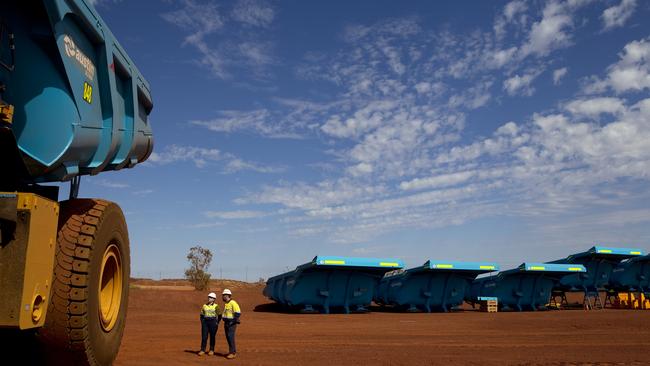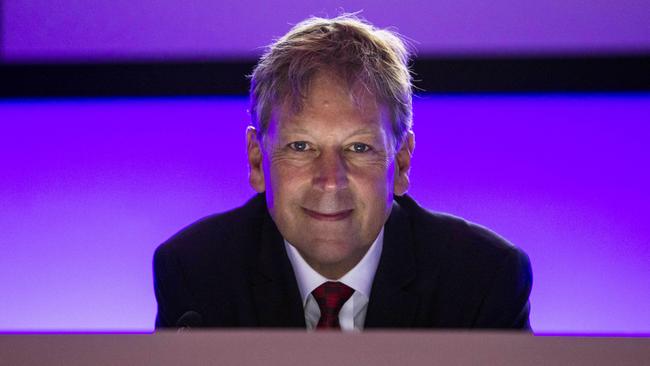Rio Tinto hit in London as dividend disappoints
The miner booked underlying earnings of $US15.6bn for the first half of the year, as falling commodity prices bit into revenue.

Rio Tinto chief executive Jakob Stausholm says he is not concerned that China’s economic woes will lead to a long-term downturn in commodities markets, as the company’s shares were battered in London on a disappointing half-year dividend.
Rio released its half-year financial results late on Wednesday, saying it will pay a $US2.67 a share interim dividend after the mining giant booked a $US8.9bn first-half net profit, 28 per cent below its record result in the first half of 2021.
While that dividend – worth $US4.3bn in total – is easily within Rio’s policy of paying out 40 to 60 per cent of its $US8.6bn in underlying earnings, the payout was well below well below analyst consensus estimates of a $US3.05 a share payout, and the company’s London listed stock was hit hard in early trading, down almost 3.5 per cent shortly after the market opened.
Last year record profits and commodity prices led to a $US5.61 a share return to holders, on $US12.2bn in underlying earnings – a payout ratio of about 75 per cent.
Speaking to journalists shortly after the company’s half-year results were released, Mr Stausholm defended the dividend declaration, saying the 50 per cent payout was consistent with the mining giant’s usual approach, despite the fact the company was now in a net cash position.
“Since we changed our dividend policy back in 2016, we have very consistently paid an interim dividend with a payout ratio of 50 per cent,” he said.
“There have been years where we have made a special dividend in the first half and we did that last year – but may I remind you that last year, exactly on the day as we speak here, the iron ore price was more than twice as high as it is today.”
Mr Stausholm said that, while market conditions for Rio’s commodities remained “good, albeit below last year’s record levels”, the company’s board had decided it was prudent to hold back cash in light of volatile markets.
“Right now with the uncertainties we are seeing, it‘s probably the right thing to do – which we have done in most years as well – and stick with the 50 per cent payout ratio,” he said.
The price of Rio’s core commodities tumbled in the first half of the year, as rapidly rising inflation rates in development economies led to fears of recession, and China’s zero-Covid lockdowns sparked fears of a growth slowdown in its economy,
But, while Mr Stausholm acknowledged the short-term outlook was “truly unpredictable”, he said Rio was not concerned China’s growth story was at risk of stalling, despite the immediate impact of Covid-19 restrictions.
“It is worth noting that China isn’t experiencing such inflationary pressures. Therefore it has more room to maintain a supportive policy stance and introduce additional easing measures to stimulate growth,” he said.
“Overall this could provide the mining industry, and Rio Tinto, an advantage over other industries considering China’s role in global commodity demand, and in particular iron ore.”
Recent falls in the iron ore price also been driven by fears that major players in China’s debt-ridden real estate market could finally face a reckoning, amid fears a crisis of confidence from buyers could send the sector into a downturn lasting years.
Mr Stausholm said concerns about China’s property market could impact Rio’s immediate prospects, but said he believed they would be a short-term issue.
“The property market is an important part of the Chinese economy and probably more so than for many Western economies, because of the growing nature of the economy,” he told reporters.
“I’m very optimistic that China will find solutions to the different parts of the economy, including the property market. I’m always very cautious about very short-term forecasting – because who knows how Covid is developing in China? But we take the long-term view at Rio Tinto.”
Rio booked underlying earnings before interest, tax, depreciation and amortisation of $US15.6bn for first half of the year, as falling commodity prices bit into the company’s revenue.
“We delivered largely flat production and solid financial results, with underlying EBITDA of $US15.6bn, free cash flow of $US7.1bn and underlying earnings of $US8.6bn,” Mr Stausholm said.
“As a result, we are paying our second highest ever interim dividend of $US4.3 billion, a 50 per cent payout, in line with our policy.”
Analysts had expected Rio to book underlying EBITDA of $US15.83bn for the first half of the year, on the back of an expected $US10.35bn EBITDA at its flagship iron ore division.
Consensus estimates tipped underlying earnings of $US8.37bn for the half, down from $US12.17bn in the first half of 2021, when the iron ore price was flying and Rio’s iron ore operations delivered EBITDA of $US16.06bn and underlying earnings if $US10.22bn.
While Rio maintained its full-year production guidance in iron ore, the impact of the rapid spread of Covid-19 through the company’s Pilbara workforce in the first three months of the year mean Rio’s first-half exports of 151.4 million tonnes still remain behind their levels in the first half of 2021.
Iron ore is still trading at around $US106 a tonne, but that is only about half of its extraordinary valuation at the same time a year ago.
Rio shares closed down $1.98, or 2 per cent at $96.98 on the ASX on Wednesday, ahead of the results.



To join the conversation, please log in. Don't have an account? Register
Join the conversation, you are commenting as Logout